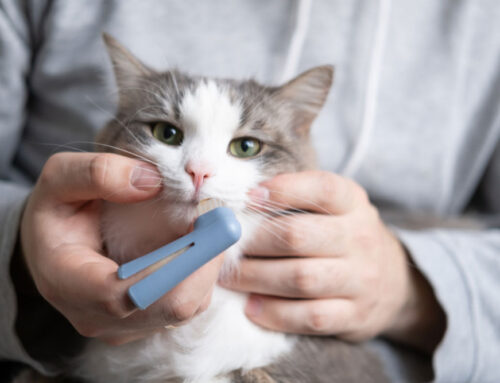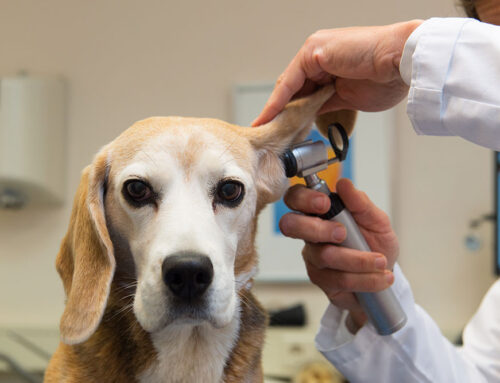Regular vaccinations are an important part of your pet’s care. Physical barriers to disease are difficult to achieve, but a vaccination is a relatively simple, but effective, method of preventing infection by surrounding your pet with a “bubble” of protection, and decreasing their risk for many serious and potentially fatal health problems. Below, Sassy the dog and Smarty the cat try to talk us out of their shots, only to get an education from our Palm City Animal Medical Center veterinarians on the value of vaccines.
Sassy the dog: “Why get three or four puppy boosters for a disease I have never seen? We’ve never heard of anyone in our neighborhood catching parvo.”
Our Palm City Animal Medical Center veterinarian: “Parvovirus is a serious threat, whether or not you’ve been around a sick dog. Dogs without symptoms, but with subclinical infections, can shed the virus in large numbers, and the virus can stay in the environment for months. Puppies need booster vaccinations every three to four weeks to build up protective immunity against parvo, and several other diseases. Proper vaccination allows you to bounce confidently along in your neighborhood, despite parvo’s presence.”
Smarty the cat: “I’m going to be an indoor cat. I don’t need vaccinations.”
Our vet: “Many infectious agents are airborne, and we know how you love to visit the neighbor cats through the screen door. With your vaccine bubble, you don’t have to worry about picking up a respiratory infection. Also, the most common cause of rabies in people is a bite from a bat that got inside their home. Most important—vaccinating against rabies is required by law in most areas of the US, for indoor and outdoor pets.
Sassy: “I’ve heard that diseases like distemper have been eradicated, and I don’t actually need the vaccinations.”
Our vet: “While vaccination has greatly reduced the incidence of devastating diseases like canine distemper, the virus still circulates, especially in shelters and wildlife. Vaccination provides a protective shield if you contact a dog who becomes infected during an outbreak.”
Sassy, looking sheepish: “The truth is—I am scared to get my shots. Isn’t there a chance I will have a bad reaction?”
Our vet: “The benefits of pet vaccination far outweigh the risk. Vaccination reactions are reported in only 5 of every 1,000 dogs. Premedication before vaccination can reduce your risk of reactions to future shots, and your vaccination plan can be adjusted, if needed. The risk of another type of reaction, injection site sarcoma in cats, is estimated to occur in only 1 of 1,000 to 1 of 10,000 cats. Pets still need the protective benefits of rabies and other core vaccinations, despite the small reaction risk. However, if you experience any reaction to a vaccination, such as fatigue, soreness, swelling, or hives, you must let us know right away.”
Smarty: “Well, at least I don’t need flu shots every year, like my humans.”
Our vet: “You are right, Smarty—there is no vaccination for influenza virus in cats, but there is a flu shot for dogs. Sassy, you should consider getting a canine influenza vaccination if you are regularly around groups of dogs, because dogs can spread canine influenza before they are sick, but the protective vaccination bubble is helpful in a quickly spreading outbreak.”
Sassy: “I’m a city dog. I don’t need vaccinations for country diseases, like lepto.”
Our vet: “We used to think of canine leptospirosis as a disease risk for dogs on farms with standing water and wildlife, but lepto cases have been rising in cities, with rat populations the suspected culprits. Leptospirosis bacteria that contaminate the environment can be contagious to dogs for months, so a protective vaccination bubble against lepto is needed, no matter where a dog lives.”
Sassy: “I’ve heard about rattlesnakes on the trails I hike with my family, and no shot can help with snake bites.”
Our vet: “Actually, a vaccine that protects against the venom of poisonous snakes is available for dogs. Florida has many poisonous snakes, but a vaccinated dog bitten by a rattlesnake, copperhead, or cottonmouth has a decreased reaction to the venom. Since snake-bite is a veterinary emergency and can be life-threatening, rattlesnake vaccination should be part of the wellness plan for dogs at risk of snake bite.”
Smarty: “Once we make it through our kitten and puppy boosters, we won’t need any vaccinations as adult pets.”
Our vet: “Periodic vaccination is needed throughout a pet’s life. Pet vaccines are licensed for minimum durations of immunity. Titers are relatively expensive, and not available for every infection, and checking certain antibody levels may not correlate to disease protection. We can plan intervals for vaccinations based on your life stage and risk, to ensure the vaccination bubble surrounds and protects you throughout life.”

Vaccination is vital for pets
Sassy and Smarty now agree—vaccines are a vital part of a pet’s health. Call or text Palm City Animal Medical Center for an appointment, and our team will develop a custom vaccination plan for your pet. Vaccinations provide the protective bubble that your pet needs to bounce happily through a healthy life.








Leave A Comment